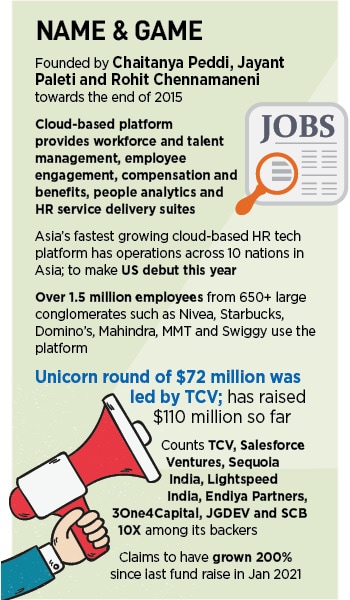The challenge indeed was quite formidable, to say the least. The three greenhorns—the Johnny-come-latelies had quit their jobs in 2015—were gearing up to pit their fledgling startup against enterprise software giants such as SAP and Oracle. “Remember, their balance sheets are as large as GDPs of African geographies," came another word of caution, trying to temper the bravado of the friends who had made up their minds to throw caution to the wind.
On the first day of the product launch, David took on Goliath. “We have launched, and yes, we compete against SAP and Oracle. We started saying that in the market," Paleti recalls his war cry. In fact, the three friends declared their aggressive intent so often that they started believing in it. “The team too started believing it," recounts the first-generation entrepreneur. The trio expected a blockbuster debut.
Paleti explains what went wrong. The first roadblock was credibility, or rather, the lack of it. The traditional companies shied away from betting on the new kids on the block. ‘What if you guys shut down next year? What would happen then?’ was one pushback that they often came across. The rejection haunted the trio.
![]() The disbelievers, to be fair, had their reasons to stay conservative. Though big firms liked the product and the vision of Darwinbox, for them to replace their HR software solutions with the ones provided by a newbie entailed massive risk. For they looked for stability, backing, experience and credibility, and unfortunately, Darwinbox had none. “For the first two years, no traditional enterprise took a bet on us," says Paleti.
The disbelievers, to be fair, had their reasons to stay conservative. Though big firms liked the product and the vision of Darwinbox, for them to replace their HR software solutions with the ones provided by a newbie entailed massive risk. For they looked for stability, backing, experience and credibility, and unfortunately, Darwinbox had none. “For the first two years, no traditional enterprise took a bet on us," says Paleti.
Luckily, for the David of this story, there was a silver lining. A bunch of ecommerce startups had started taking off in India in 2016. Most young founders were hiring aggressively, displaying a huge risk appetite and exhibiting a healthy disregard for experience. Passion, product and nimbleness were being more valued than pedigree and track record. “We started working with the internet companies," says Paleti.
There was another silver lining. The big boys—the SAPs and Oracles of the world—were not looking at startups as their business clients. “We knew this was the moment, and we capitalised [on it]," he says. Working with young entrepreneurs, who were taking a punt on the co-founders of Darwinbox, brought in its wake a positive collateral. Paleti calls it serendipity. Outside all the entrances of Darwinbox offices, the co-founders hung a quote by Charles Darwin. “It’s in bold and blue," Paleti says, as he goes on to recite the dictum. It is not the strongest of the species that survives. Nor is the most intelligent. It is the one most adaptable to change. And this is what happened in the first two years of the business. Darwinbox adapted, and it survived
The co-founders had to gallop to keep up with the pace of the growth of their startup clients. It was not only the scale of hiring that was mind-boggling, but also the high expectations of the startups in terms of technology and user experience. “We too kept on evolving to solve for their scale. And this became the DNA of Darwinbox," says Paleti, adding that the HR startup now works with 25 unicorns [startups valued at more than $1 billion] across India, Southeast Asia, and the Middle East. “For the first two years, 80 percent of the revenues came from internet startups," he says, declining to share the financials.
![]()
The journey turns out to be rewarding. Cut to January 2022. Darwinbox enters the unicorn stable with a $72 million funding round led by Technology Crossover Ventures (TCV), along with participation from existing investors Salesforce Ventures, Sequoia Capital India, Lightspeed India, Endiya Partners, 3One4Capital, JGDEV and SCB 10X. TCV is a backer that holds a record of 79 IPOs in its portfolio, including Netflix, Facebook, Expedia, Spotify, Airbnb, GoDaddy and GitLab.
Darwinbox is the first Software as a Service (SaaS) company to turn unicorn this year. It has also emerged as Asia’s fastest growing cloud-based HR tech platform, with operations spanning across 10 nations in Asia, and is set to make US debut this year, with raising over $110 million in funding so far. From a pariah in 2016, Darwinbox has become a darling of over 650 conglomerates. Over 1.5 million employees use the platform, and this number has grown 200 percent since the last fundraise from Salesforces Ventures in January last year. “We want to build a great product story from India for the world in the HR space," says Paleti.
![]()
The backers are delighted with the growth trajectory of Darwinbox. The onset of pandemic, they reckon, turned out to be another silver lining. While the global SaaS ecosystem had been gaining traction gradually for a decade or more, the pandemic accelerated demand as enterprises were compelled to expedite the digitisation of their businesses in order to remain competitive, says Sateesh Andra, managing director at Endiya Partners. The Venture Capital (VC) firm invested in Darwinbox at the seed stage in 2016.
Last year, US technology research and consulting company Gartner had forecast global end-user spending on SaaS growing to over $140 billion in 2022. The need to transition to cloud-enabled SaaS platforms has become urgent in human capital management as remote and hybrid workforces take centre stage, says Andra, who backed Darwinbox in 2016 with a conviction that Indian SaaS startups were uniquely positioned to gain market leadership. Within a year of his seed investment, Darwinbox scaled to 60 enterprise clients and one lakh end-users, he claims.
![]()
Today, Darwinbox, he explains, commands an average contract value of $75,000 and has thrice doubled its annual recurring revenue (ARR). It is creating a playbook for more SaaS companies, as it goes up and wins against established players such as SAP, Oracle, and Workday, Andra adds.
For Harshjit Sethi, managing director at Sequoia Capital India, betting on Darwinbox in 2019 was like taking a contrarian bet on India. A lot of successes in SaaS was focused on the US market, he explains, so the idea was that if one wants to build a really large company, then ones needs to work for the US market. “We were convinced that India will inflect and Indian enterprises will start consuming SaaS," he says, adding that Darwinbox had a compelling product proposition.
![]()
First, they were building a horizontal HR software, which was sector-agnostic. Second, they understood the cultural nuances in HR, which helped them scale in Asian countries. “They were also fearless and smart," says Sethi. While their formidable rivals went after enterprises in the West, which mostly focused on desktop, Darwinbox built a strong mobile product. “They had a pulse on the market," he adds. “They went with the flow."
Since his school days, Paleti recalls, he has been going with the flow. “Our backgrounds are fairly straightforward. It is a typical South Indian story," he laughs. His father was a doctor and being part of a middle-class family, Paleti had two choices while he was growing up: Doctor or engineer. “I chose to become an engineer," he says.
![]()
The studious boy made it to IIT, completed his degree and then figured out that he never wanted to get into biotech. He did not know what to do. “And when you do not know what to do, you do an MBA," he laughs. Paleti became an investment banker and worked for a few years.
In 2015 came the light-bulb moment. As an investment banker advising one of the Indian R&D companies that was about to be being bought by a US firm, Paleti had devised a long checklist for the promoters to adhere to. ‘If you do not know anything during the diligence, then please just say that you would come back’, was the simple directive to the Indian promoter, who was infamous for shooting his mouth. From dishing out the wrong attrition numbers—though he was confident that he knew best—to boasting about the HR policies of the company, the promoter was a master of exaggeration.
![]()
Poor Paleti could do nothing. A week later, came the shocker when data on attrition rate at the company emerged. “It was 22 percent," he recalls. This made Paleti think seriously about the HR problem. “The system was broken, and it needed to be fixed," he argued. Along with his friends, he started Darwinbox in 2015. But the first six months, they were all over the place and could not identify the right segment to target.
After six months, enlightenment came in a small room, cramped with 20 employees, in Hyderabad. The co-founders realised that despite their rich work experience with big enterprises, they have been off the mark by focusing on smaller and mid-segment businesses. “We knew their wants, pain points and problems," he says. The rest is history.
Now, Paleti has set an ambitious target to touch an annual recurring revenue of $100 million over the next two-and-a-half years. Over one-third of Darwinbox’s portfolio today is a replacement of SAP and Oracle. “These guys take us so seriously that you cannot falter," he laughs, alluding to being under constant scrutiny and pressure. Now, David is getting ready to take the fight to the Goliaths in the US. The mavericks, and the latest SaaS unicorn in the town, is hungry for more.

 From L to R - Jayant Paleti, Chaitanya Peddi and Rohit Chennamaneni, Co-founders, Darwinbox
From L to R - Jayant Paleti, Chaitanya Peddi and Rohit Chennamaneni, Co-founders, Darwinbox The disbelievers, to be fair, had their reasons to stay conservative. Though big firms liked the product and the vision of Darwinbox, for them to replace their HR software solutions with the ones provided by a newbie entailed massive risk. For they looked for stability, backing, experience and credibility, and unfortunately, Darwinbox had none. “For the first two years, no traditional enterprise took a bet on us," says Paleti.
The disbelievers, to be fair, had their reasons to stay conservative. Though big firms liked the product and the vision of Darwinbox, for them to replace their HR software solutions with the ones provided by a newbie entailed massive risk. For they looked for stability, backing, experience and credibility, and unfortunately, Darwinbox had none. “For the first two years, no traditional enterprise took a bet on us," says Paleti.





